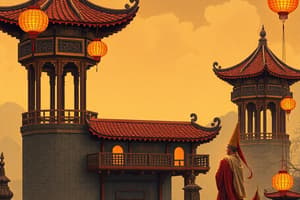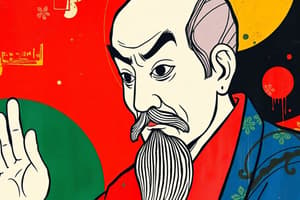Podcast
Questions and Answers
What was the focus of Ming Confucianism Scholars during the Ming Dynasty?
What was the focus of Ming Confucianism Scholars during the Ming Dynasty?
- Emphasizing the importance of heavenly relations over earthly relations
- Uniting a person’s mind with the heavens and their relation to the earth
- Emphasizing the separation of a person’s mind from their actions
- Uniting a person’s mind with his actions and their relation to the earth (correct)
What was the main preaching of Ming Confucianism Scholars during the Ming Dynasty?
What was the main preaching of Ming Confucianism Scholars during the Ming Dynasty?
- Balancing Confucianism with everyday life (correct)
- Emphasizing the pursuit of heavenly enlightenment over everyday life
- Disregarding the importance of everyday life in Confucianism
- Separating Confucianism from everyday life
How did Ming Confucianism Scholars view the relation of a person’s mind and actions to the earth and heavens?
How did Ming Confucianism Scholars view the relation of a person’s mind and actions to the earth and heavens?
- They focused on the relation to the earth instead of the heavens (correct)
- They emphasized the separation of the mind from earthly and heavenly relations
- They prioritized the relation to the heavens over the earth
- They disregarded the relation to both the earth and heavens
What effect did the revitalization of education have in modern Confucian China?
What effect did the revitalization of education have in modern Confucian China?
How did modern scholars incorporate Confucian themes into personal and bureaucratic life?
How did modern scholars incorporate Confucian themes into personal and bureaucratic life?
What was the government's approach to individual autonomy in modern Confucian China?
What was the government's approach to individual autonomy in modern Confucian China?
In modern Confucian China, what was favored over individual effort?
In modern Confucian China, what was favored over individual effort?
How did young Chinese intellectuals initially respond to traditional Confucianism?
How did young Chinese intellectuals initially respond to traditional Confucianism?
Flashcards are hidden until you start studying
Study Notes
Ming Confucianism Scholars during the Ming Dynasty
- Focus was on reviving and reinterpreting Confucian classics and values
Key Teachings of Ming Confucianism Scholars
- Emphasized the importance of self-cultivation, personal morality, and good governance
- Preached the need for individuals to cultivate their minds and characters to bring about social and political transformation
View on Mind-Action Relation
- Believed that a person's mind and actions were connected to the harmony of the earth and heavens
- Saw the individual as a microcosm of the natural world, with personal virtues reflecting the virtues of heaven and earth
Impact of Education Revitalization
- Led to the development of a more educated and merit-based bureaucracy in modern Confucian China
- Fostered the growth of a class of educated officials who were committed to Confucian values and principles
Incorporating Confucian Themes
- Scholars incorporated Confucian themes into personal and bureaucratic life by emphasizing moral character, social hierarchy, and proper relationships
- Applied Confucian values to governance, education, and social reform
Government Approach to Individual Autonomy
- Favored collective order and social harmony over individual autonomy and freedom
- Emphasized the importance of social hierarchy and obedience to authority
Favored over Individual Effort
- Collective moral character and social harmony were favored over individual achievement and effort
Initial Response to Traditional Confucianism
- Young Chinese intellectuals initially responded to traditional Confucianism with skepticism and criticism, viewing it as outdated and restrictive
Studying That Suits You
Use AI to generate personalized quizzes and flashcards to suit your learning preferences.




